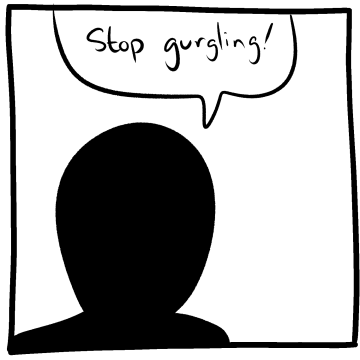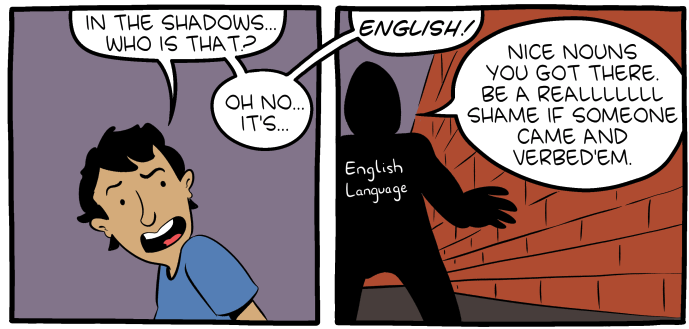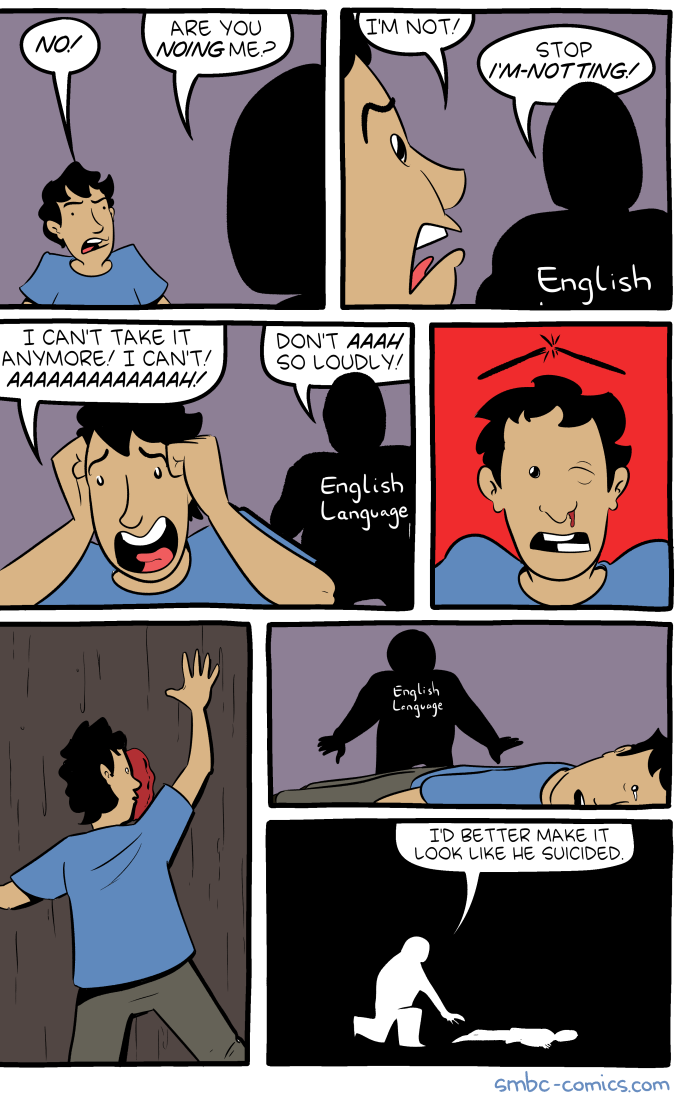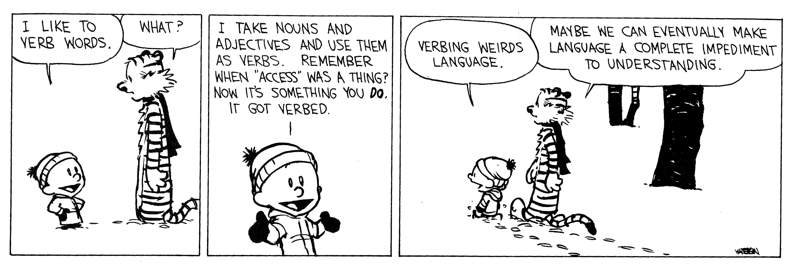Nouning and verbing
« previous post | next post »
Today's SMBC starts this way:
The rest of the story:
The aftercomic:

Lots of previous discussion of this issue…
(And Interestingly, of the six entities that are verbed in this strip ("verbed", "no-ing", "I'm-notting", "aah", "suicided", "gurgling") only three are actually nouns.
Of course there's the famous Calvin & Hobbes comic:



Victor Mair said,
July 7, 2018 @ 9:40 am
In Sino-English, it is common to use expressions like "He was suicided." It seems to have happened to Wang Jian, the late head of the erstwhile giant Chinese conglomerate HNA, in France a few days ago, and it has been happening to bankers, bureaucrats, businessmen, et al. with increasing frequency during the last few years in China.
I have often pondered whether the earliest roots of language are verbal or nounal. In Sinitic, practically all words can be thought of as verbs. For example, we speak of "stative verbs" or "adjectival verbs", such as "(to be) red".
Then there are the ubiquitous "I ❤️ XX" declarations on bumper stickers, t-shirts, and so forth.
For some examples and references, see:
"A trilingual, biscriptal note (with emoji)" (2/5/17)
http://languagelog.ldc.upenn.edu/nll/?p=30847
Even the earliest existence of a concept such as "heart" may be thought of as "to exist as that blood-pumping body part".
"Ur-etyma: how many are there?" (7/6/14)
http://languagelog.ldc.upenn.edu/nll/?p=13311
Ben Zimmer said,
July 7, 2018 @ 11:58 am
Victor previously wrote about "suicided" here.
David Marjanović said,
July 7, 2018 @ 1:09 pm
Ancient Sanskrit grammarians already wondered whether all, and not just most, Sanskrit roots were fundamentally verbs. They ended up deciding against it.
A few Salishan languages do seem to have no distinction between nouns (even proper names) and verbs at all, but that is very much the exception and has never, to the best of my quite limited knowledge, been claimed to be some kind of original state of language.
There is a tradition in Semitic lexicography to interpret as many roots as possible as fundamentally verbs, and considering nominal meanings of the same roots derivations, even when there's actually evidence for the other direction. This may have carried over into PIE reconstruction.
EvelynU said,
July 7, 2018 @ 2:36 pm
My ESL students (mostly Asian) all want to use "suicide" as a verb. I've stopped correcting them, since I've learned that some experts object to "committed suicide" as implying a crime or at least blame. They want "died by suicide" but I'm going to let the ESL students lead the way. (Also, Korean and Japanese students use "challenge" in a way that feels odd to me, but I've also decided that they are ahead of the curve, so I've stopped correcting it. They say things like, "I decided to challenge tennis" meaning "I decided to challenge myself to learn to play tennis." their way makes sense, so I'm rolling with it.
V said,
July 7, 2018 @ 7:23 pm
It's also an allusion to James Nicoll's epigram:
"The problem with defending the purity of the English language is that English is about as pure as a cribhouse whore. We don't just borrow words; on occasion, English has pursued other languages down alleyways to beat them unconscious and riffle their pockets for new vocabulary."
In that the English language chases someone down an alley.
David Morris said,
July 8, 2018 @ 12:32 am
The first dictionary I checked (Dictionary.com) unhesitatingly lists 'suicide' as a verb.
jick said,
July 8, 2018 @ 1:04 am
> They say things like, "I decided to challenge tennis" meaning "I decided to challenge myself to learn to play tennis."
That's what happens when English textbooks say "challenge" means "도전", blindly equating two words from two different languages.
…And of course it works the other way as well. Back when I was a boy, 환상적 meant "fantastic = related to, or pertaining to, a fantasy". Now newscasters say 환상적인 만남 = "a fantastic (= great) meeting" when they quote Trump describing his meeting with Kim Jong Un, and nobody considers it strange at all.
Aaaarrgh. And get off my lawn.
phspaelti said,
July 8, 2018 @ 9:15 am
I can't say about Korean, but for Japanese the problem is not dictionaries, but rather word borrowing. チャレンジする is listed in the closest dictionary as "trying hard to do something", with an example テニスにチャレンジすれば? (Tenisu-ni charenji-sureba?) "Why don't you give tennis a try?"
Japanese students who are doing what @EvelynU suggests are really just treating the English word as if it were the same as the Japanese. This is a general problem with words borrowed from English. And it affects not only the meaning, such as when they use "make" to mean "make-up" (which they also treat as a verb, but meaning "to put on make-up"), and many others.
han_meng said,
July 8, 2018 @ 11:01 am
Mouseover text for cartoon:
"Fifty years after 'verb' becomes a verb, someone will create 'deverb' which means the same thing as 'verb.'"
https://www.smbc-comics.com/comic/noun
han_meng said,
July 8, 2018 @ 11:10 am
@ EvelynU,
from
https://en.wikipedia.org/wiki/Death_of_Li_Wangyang
Friends and local activists strongly allege that Li was "suicided" (被自殺), and formed a 'Committee in quest of the truth about Li's death'.
Ryan said,
July 8, 2018 @ 3:07 pm
@EvelynU
If someone had said to me, "I decided to challenge tennis," I'd honestly have no idea what they meant, given that you don't challenge tennis the same way you, say, challenge the status quo.
Of course, we still talk about taking on or tackling activities, so what do I know.
cliff arroyo said,
July 9, 2018 @ 1:21 am
@Ryan
I would assume the person had invented a new sport and saw it as a rival to tennis.
ajay said,
July 9, 2018 @ 5:24 am
They say things like, "I decided to challenge tennis" meaning "I decided to challenge myself to learn to play tennis."
I like the gung-ho attitude this reveals. I will not just "give tennis a try" or "attempt to learn to play tennis". I will CHALLENGE tennis. And I will DEFEAT it. I will have CONQUERED tennis.
(We talk about winning a game, or beating someone at a game; we also talk about beating a game when it's a single-player computer game, and you've played it successfully all the way through.)
jim said,
July 9, 2018 @ 12:23 pm
And then there's "cyber", in my mind neither a verb or a stand alone noun, but used as both. "Do you cyber?" "We have cyber!"
John said,
July 10, 2018 @ 10:22 am
This is one I've never come across before
https://www.theregister.co.uk/2018/07/09/the_impact_of_the_open_workspace_on_human_collaboration/
"Even as we architect transparent … spaces"
Just makes me cringe. More surprising as it's from a paper by these guys…
http://rstb.royalsocietypublishing.org/content/373/1753/20170239
subscribing said,
July 11, 2018 @ 12:38 pm
i have always enjoyed the fact that the opposite of this (a verb used as a noun) is called a "gerund". to my knowledge, "verbing" has no formal name. does it?
dainichi said,
July 12, 2018 @ 7:01 pm
Verbal zero-derivation?
Ellen K. said,
July 13, 2018 @ 9:49 am
@subscribing
No, a gerund is specifically an -ing form. A verb can be formed from a noun without an -ing and it's not a gerund. The example that comes to mind is "I'll have a go at it".
Bruce said,
July 14, 2018 @ 11:03 pm
I could have sworn I've heard Americans refer to "challenging" a course, e.g. taking a test so they can skip Biology 101 and go straight into Biology 201. Seems like a similar usage to the Japanese/Korean students.
example:
https://www.colorado.edu/registrar/students/degree-planning/challenge-course